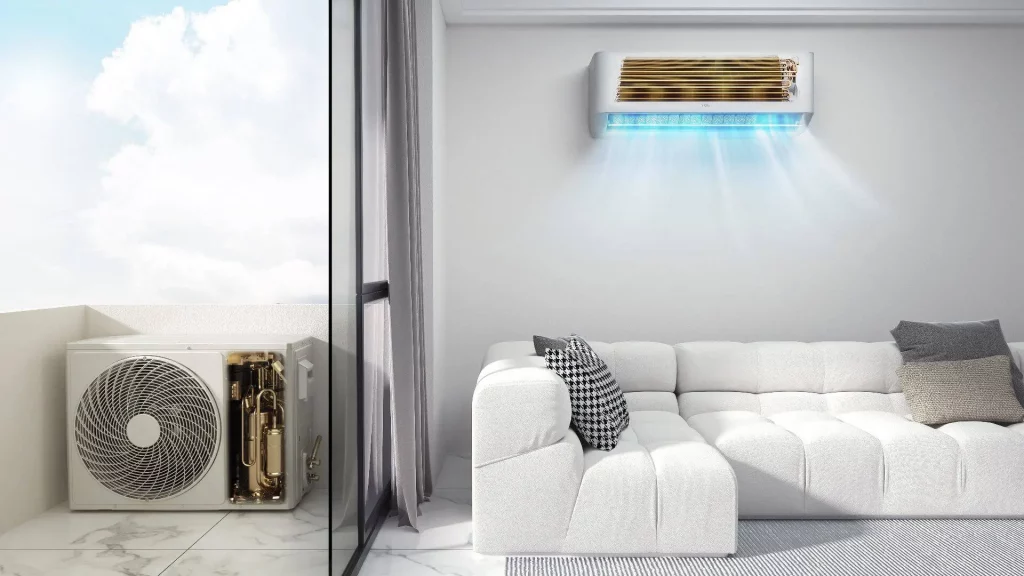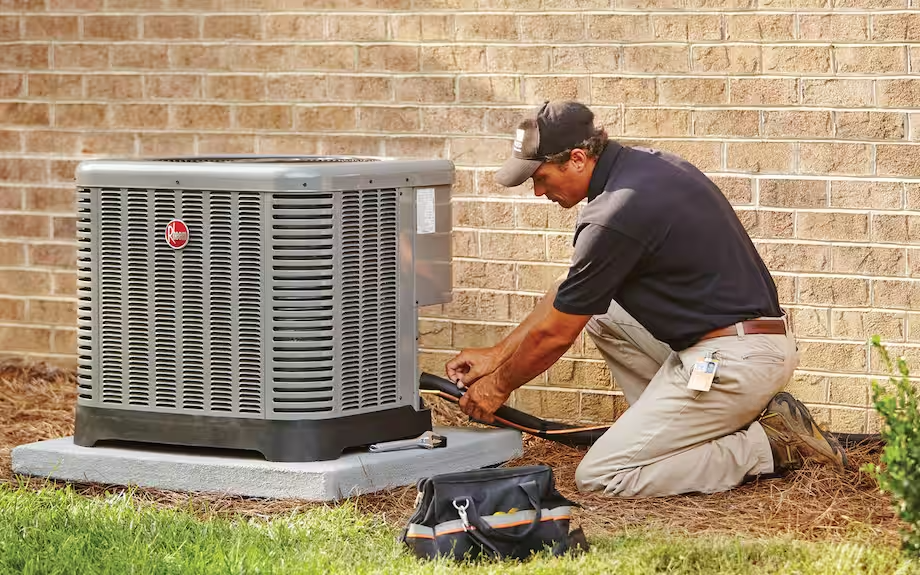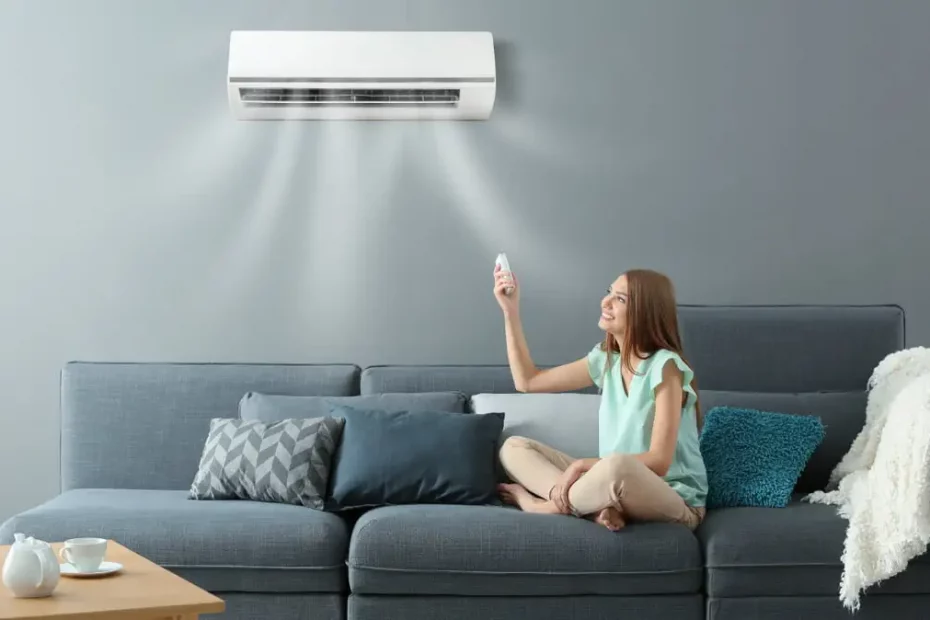As you consider improving the comfort of your home, air conditioning installation may come to mind. With UK summers growing increasingly warm, adding an AC unit could provide welcome relief during hot summer days. Before deciding on this home improvement, educate yourself on the costs, logistics, and considerations involved with installing air conditioning in a UK home. Doing thorough research beforehand allows you to make the best decision for your household’s need and budget.
As you weigh the pros and cons of central, ductless, portable, and window AC units, this article provides key factors that homeowners should understand when installing cooling systems suited for British properties and climate.
Types of Air Conditioning Units for Homes
There are three main types of air conditioning units suitable for residential properties in the UK:
Central Air Conditioners
Central air conditioners, also known as whole-house or central heating, ventilation and air conditioning (HVAC) systems, circulate cooled air through a system of supply and return ducts. The condenser unit is installed in the attic or cellar. Central AC systems require professional installation by provide even cooling throughout the home.
Window Air Conditioners
Window AC units are self-contained appliances installed in a window or wall opening. They draw air from the room, cool it and circulate it back into the room. However, they can be difficult to seal and insulate properly and may present an intrusion from the outside. They can also be noisy and block natural light.
Split System Air Conditioners
Split System Air Conditioners feature an outdoor condenser unit and one or more indoor air handling units connected by refrigerant lines. The air handling units can be mounted on walls or ceilings and circulate air within individual rooms or zones. Split systems provide flexible and targeted cooling but require professional installation of the refrigerant lines. They tend to be more expensive than window AC’s but cheaper than central AC systems
When selecting an air conditioning system for your home, consider factors like the size and layout of your property, your budget, and specific cooling needs. A reputable HVAC professional can help determine the right solution based on your unique requirements and ensure proper installation of any equipment for maximum efficiency, comfort, and peace of mind.
Benefits of installing Air conditioning
Installing an air conditioning unit in your home can provide several advantages. As a homeowner in the UK, adding air conditioning to your property can increase its value and make it more appealing to potential buyers. In addition, it offers benefits to you as the current owner.
Improved Comfort
Air conditioning allows you to control the temperature in your home and maintain an ideal level of comfort. During hot summer months, it can cool the air and reduce humidity, making the indoor environment pleasant. You will no longer have to rely on fans and open window for cooling. With a thermostat, you can set the perfect temperature for your needs.
Healthier Indoor Air
Proper air conditioning also helps improve the quality of air in your home. It reduces pollutants like mold, mildew and allergens that can build up in warm, humid weather. An AC unit filters the air in your home, removing dust, pet dander and other particles. It can also help minimize the growth of bacteria and viruses that thrive in hot and humid conditions. This leads to an overall healthier environment within your home.
Lower Energy Bills
Surprisingly, air conditioning can help lower your energy costs over time. Although the unit itself requires electricity to run, a properly installed AC system reduces the need to power multiple fans to stay cool. It is also more energy efficient overall, especially if you select an Energy Star rated model. Keeping the doors and windows closed while the AC is on also helps contain cooled air, reducing energy usage.
Added Property Value
Installing air conditioning is a desirable feature for many homebuyers. It can significantly increase the resale value of your property, as buyers will likely pay more for a home with central AC. According to several studies, adding air conditioning to a property can raise its value by 7-15% or more. If you do plan to sell your home in the coming years, installing AC is an investment that may provide a solid return

How Much Does an Air Conditioning UK Installation Cost?
The cost of an air conditioning unit installation in the UK can vary depending on the size and type of AC system you chose. On average you can expect to pay between £1,500 to £4,500 for a high quality AC installation in a typical home.
Types of Air Conditioning System
The type of AC system you select will significantly impact the total installation cost. A small wall-mounted unit for a single room may cost £500 – £1,500 installed, while a multi-split system for multiple rooms may be £2,000 – £4,500. A full central AC system for the whole house will be on the higher end of the range, from £3,500 – £8,000 or more installed.
AC Unit Size
The size, or cooling capacity, of the AC unit also determines the installation cost. Units are rated in kW (kilowatts) to indicate how much heat they can remove. A small 3-4 kW may suit a bedroom or study and costs less to install versus a 12-18 kW unit for an open-plan living space. As the unit size increases, the installation becomes more complex, requiring larger conduits and piping, which adds to the total cost.
Additional Costs
Other factors that can increase your installation fees include:
- The location of outdoor components like condenser units. Roof mounting or platforms may be needed which require additional parts and labour.
- Upgrading your home’s electrical supply to handle the AC system. This may involve installing a new breaker panel or wiring which adds several hundred pounds to the total.
- Extra features like programmable thermostats, air filters or zone control systems. These additional components increase the complexity and time required for installation
- The experience and qualification of your installer. Reputable companies with certified technicians will likely charge higher rates. However, their work is also more likely to meet building standards and the manufacturer’s specifications.
In summary, while a high-quality AC installation in typical UK home may cost between £1,500 and £4,500 on average, the final price for your home will depend on the specific type, size and features of the system you choose. Getting multiple detailed quotes from reputable companies is the best way to determine an accurate price.
Finding the Right Installer
Check for proper accreditation and licensing
When hiring an air conditioning installer, ensure they have the proper accreditation and licenses to install units in residential properties. Reputable installers will be certified and insured to work in people homes. Ask about their certification and insurance to avoid issues that could arise from unqualified installers.
Look for experience installing your specific AC unit
Different types of air conditioning units have unique installation requirements. Choose an installer with experience putting in the kind of unit you need, whether it’s a window unit, mini split, central AC, or other system. Installers familiar with your AC type will be better equipped to install it and address any issues that come up.
Get references and reviews
Ask the installers you’re considering for references from previous clients. Contact the references and ask about their overall experience, the installers responsiveness, and if they are satisfied with the finished work. Check online reviews as well to determine the installers reputation and see experiences of other homeowners. Look for a history of timely, high-quality installations and good customer service.
Compare estimates thoroughly
When comparing estimates from different installers, look beyond just the bottom line price. Examine what’s included, like the AC unit itself, additional part and materials, removal of the old unit and labour. Ask for estimates in writing with a detailed breakdown of services and fees. The installer with the lowest upfront cost may charge more in the long run if the initial estimate leave out key components.
Ask about warranties and ongoing service
High-quality AC installers will offer strong product warranties and their own workmanship warranties. They should also have an ongoing service relationship with clients, providing maintenance, repairs and answers to questions about the new unit and its use. Prioritise installers willing to stand by their products and work long after the initial installation is complete.

Troubleshooting Common Air Conditioning Problems
Unit Will Not Turn On
If your air conditioning unit will not turn on at all, first check that the unit it plugged in properly and the circuit breaker has not tripped. Next, check the thermostat to confirm it is set to ‘cool’ mode and the temperature is adjusted to a level below the current room temperature. If issues persist, it is best to contact a HVAC technician to inspect the unit. There may be an issue with the compressor, condenser coils, or the other internal components needing repair or replacement.
Not Cooling Effectively
If your air conditioner is running but not cooling properly, the most common issues are:
- Dirty air filter: A clogged filter reduces airflow and efficiency. Replace or clean the filter.
- Refrigerant Leak: The refrigerant absorbs heat as it evaporates and is essential for cooling. Have an HVAC technician inspect for leaks and recharge the refrigerant.
- Condenser coils dirty: The condenser coils release heat as the refrigerant condenses. Dirty or blocked coils reduce heat transfer and cooling capacity. Carefully clean the condenser coils to restore performance.
- Improper air circulation: Ensure air vents, registers, and return grills are clean and open. An unbalanced system with some vents close and others open will reduce cooling.
- Thermostat malfunction: If the thermostat is not properly sensing the temperature, the unit will run ineffectively. Test or replace the thermostat to resolve the issue.
- Compressor issues: The compressor is responsible for circulating the refrigerant through the system. Have a HVAC technician test the compressor and systems pressures to determine if repairs or replacement are needed.
Following these troubleshooting steps can help diagnose and resolve common air conditioning problems. However, for the best results and to avoid potential hazards, it is recommended any major repairs or refrigerant recharging be performed be a licensed HVAC technician. Regular professional maintenance and service will also help keep your unit running safely and efficiently.
Air Conditioning Installers FAQ’s: Your Top Questions Answered
As you consider installing an air conditioning unit in your home, you likely have several questions about the process and what to expect. Here are answers to some of the most frequently asked questions homeowners have when planning air conditioning installation.
The total cost will depend on the size and type of the air conditioning system you choose. For a typical 3 to 4 bed house, you can expect to pay £3,500 to £5,500 for a high-efficiency unit with professional installation. The Unit itself may account for £1,500 to £3,500 of that total cost. Installation fees are usually £500 to £1,500 or more, depending on the complexity of your setup.
In most cases, you do not need specific permission to install air conditioning in your home. However, there are some exceptions. If you live in a listed building or conservation area you will likely need consent. You should also check with your local council regarding any restrictions on external condenser units.
The installation process for a central air conditioning system typically take between 1 to 3 days for a medium size home.
To keep you air conditioning system running efficiently, schedule routine maintenance with a professional technician once a year. They will inspect the filters, ductwork, drainage and all components for proper functioning.
Conclusion
As a homeowner, staying informed and planning ahead is key when it comes to home improvements like installing air conditioning. Take time to understand the costs, find qualified professionals, consider energy efficiency and make upgrades where it makes sense for your home and budget. With the UK climate warming, more households may turn to cooling solutions but proceed thoughtfully.
Consider starting with simple solutions like fans, insulation and window shades before taking on the project of installing a full HVAC system. Either way, arm yourself with information so you can make the best decision for your home.

